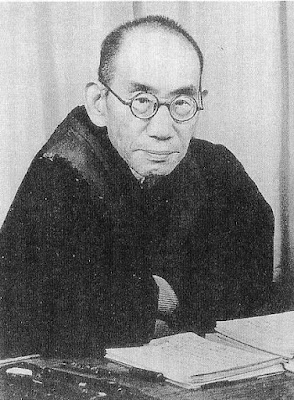 |
| Keiji Nishitani |
The Kyoto School is a name given to a group of Japanese scholars/Buddhists who seek to relate the "eastern" philosophies of Buddhism (particularly Zen) with Western Philosophy. Pretty heavy stuff and maybe a few of the books published could be prescribed by GP's to insomniacs. But there are jewels amid the turgid prose if you dive in.
One of the greatest tomes is "Religion and Nothingness" by Keiji Nishitani. Which at heart contrasts the Western preoccupation and allegiance to Being (as substance) with the eastern idea of "emptiness". All good stuff if you like that sort of thing.......
At the moment I am ploughing through an anthology of writings by the Kyoto School, "The Buddha Eye". I have read through this a few years ago, and found a lot over my head, in one ear and out the other, but I'm giving it another try. Some good stuff, as I said.
One essay is by the previously mentioned Keiji Nishitani, "The I-Thou Relation in Zen Buddhism". Pretty deep stuff. Nishitani mentions the Jewish scholar Martin Buber, who wrote a famous book, "I and Thou", this from the Western perspective of a "self" confronting another. God, or a fellow human being? Not sure - I do have a kindle copy of Buber's book but failed to get far into it. Way beyond me.
 |
| Martin Buber |
Well, Nishitani writes that Mr Buber does not really touch the full depths of human subjectivity. Where Buber stops "is the very point at which Zen exploration begins". His claim is based upon one of the Koans from the Blue Cliff Record Collection, the one called ""Kyozan Roars with Laughter." I always find a bit of laughter attractive, but my sniggers were stiflled somewhat upon reading the koan:-
Kyozan Ejaku asked Sansho Enen, "What is your name?"
Sansho said, "Ejaku!"
"Ejaku!" replied Kyozan, "that's my name."
"Well then," said Sansho, "my name is Enen."
Kyozan roared with laughter.
Well, the joke was lost on me, but I was bolstered by Dogen's claim that where we do not understand, there is our understanding. A claim that I am beginning to understand.
Nishitani, using eastern philosophies of inter-being, internal relations and suchlike, brings forth the fruits of the koan. Individual "selves" in opposition are morphed into a fundamental empathic relationship.
Trying to reach more understanding, I was reminded of some words of Richard Tarnas in his book "Cosmos and Psyche":-
......the modern mind engages the world within an explicit experiential structure of being a subject set apart from, and in some sense over against, an object. The modern world is full of objects, which the human subject confronts and acts upon from its unique position of conscious autonomy. By contrast, the primal mind engages the world more as a subject embedded in a world of subjects, with no absolute boundaries between or among them. In the primal perspective, the world is full of subjects. The primal world is saturated with subjectivity, interiority, intrinsic meanings and purposes.
I would see Nishitani as speaking more of the "primal mind". Maybe I'm wrong.
Anyway, in my defence I do find myself more open to others, less judgemental. Maybe enough for now, my coffee is finished and off I go to Oxfam to man the tills and listen to a bit







No comments:
Post a Comment